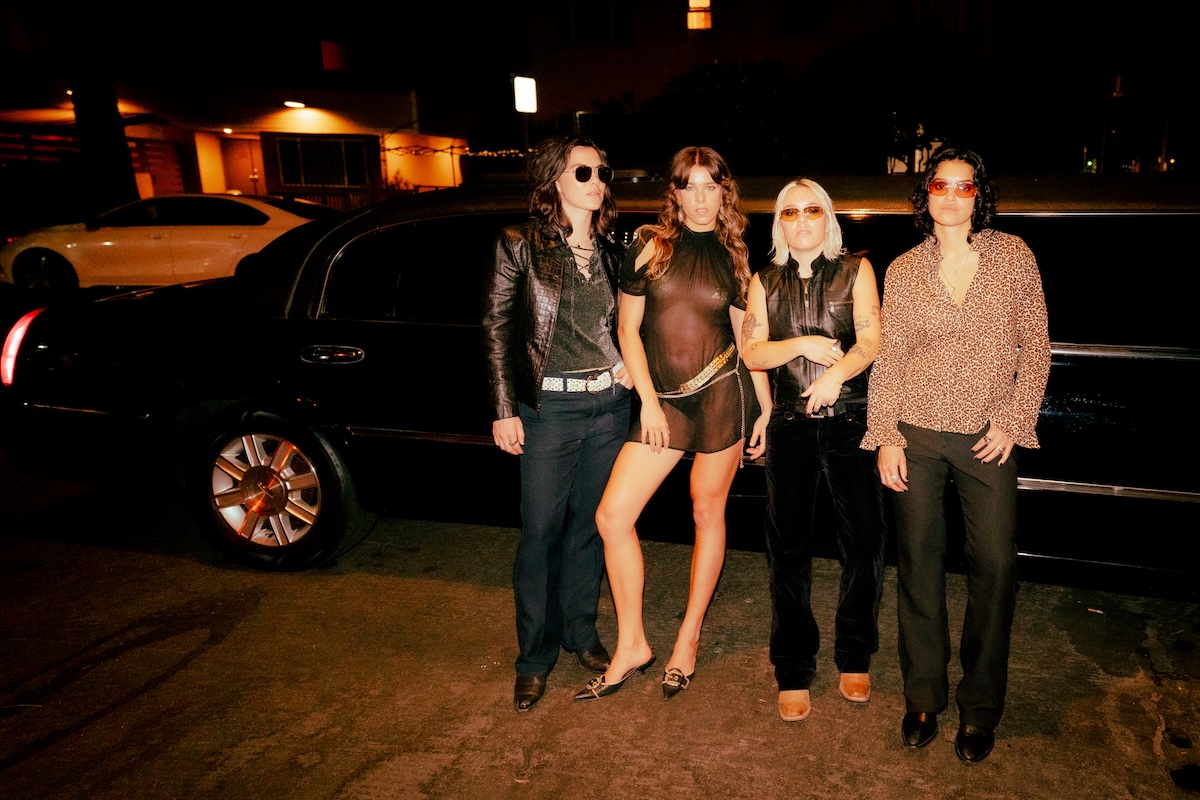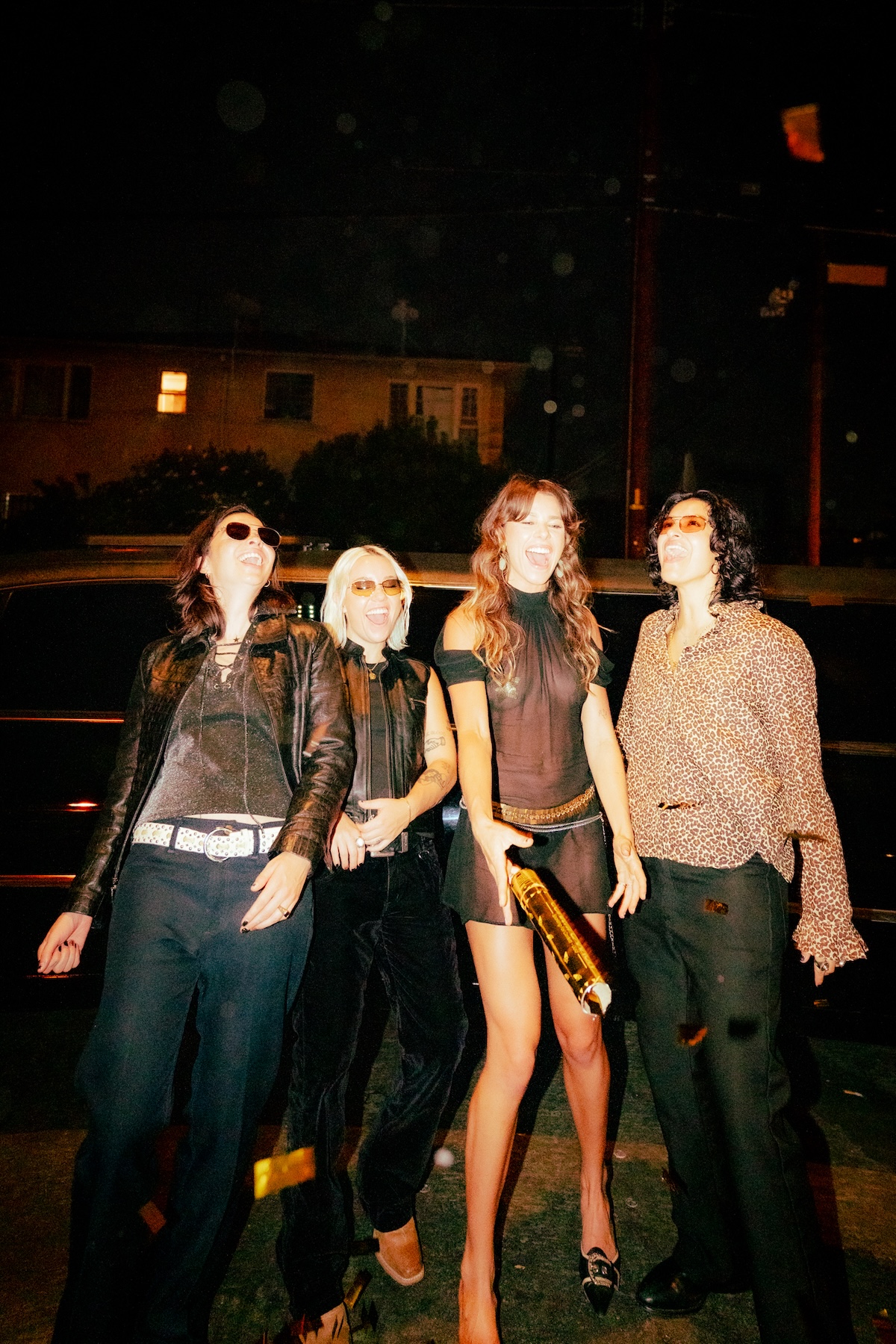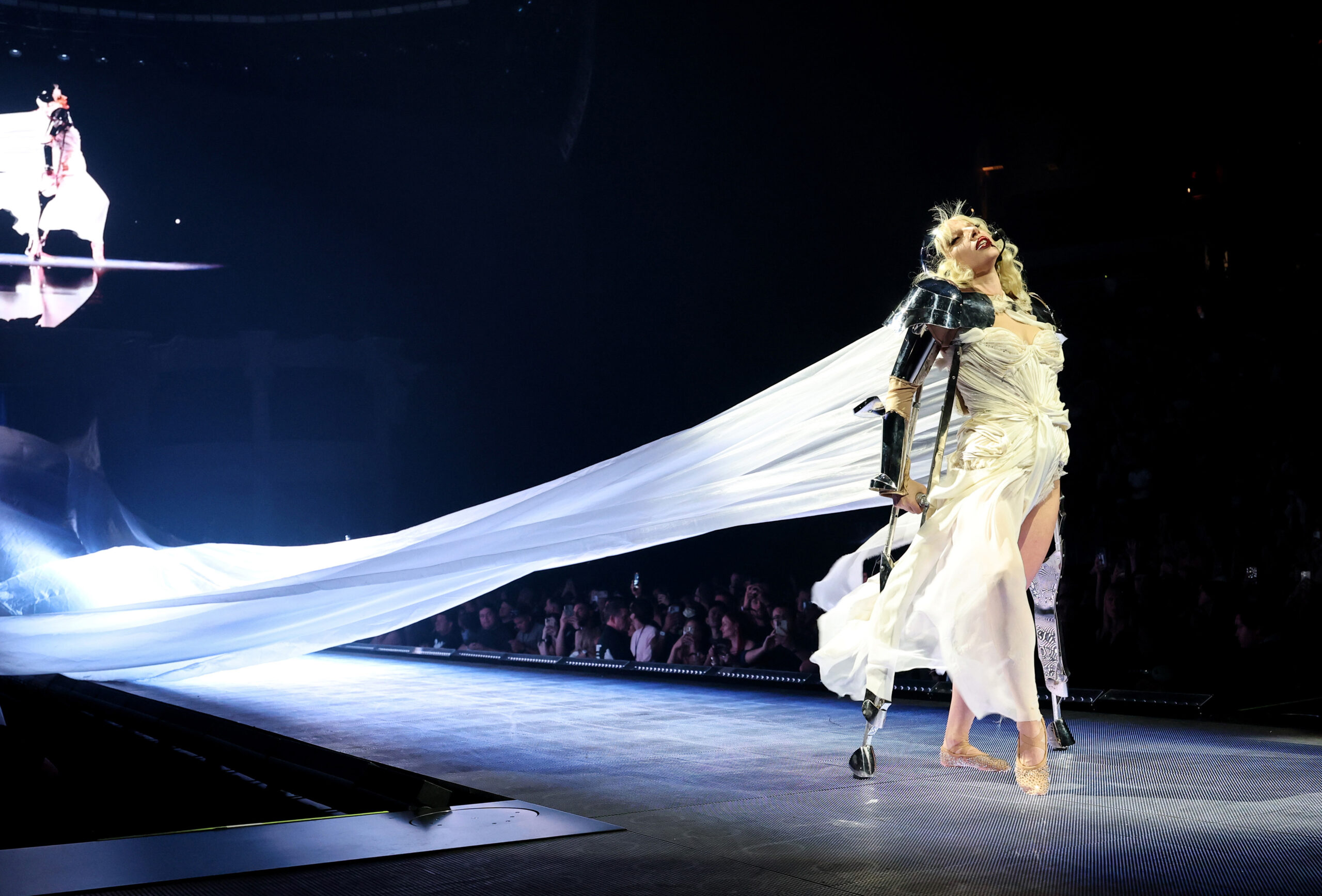
No one’s having more fun at the Aces’ Gold Star Baby record release party than the band themselves. On the Saturday Night Fever-style light block dancefloor at Los Angeles’ Kiss Kiss Bang Bang, vocalist Cristal Ramirez, her sister and drummer Alisa Ramirez, guitarist Katie Henderson, and bassist McKenna Petty throw shapes while singing along to their feelgood, disco-soaked jams.
The mood is contagious, and the venue, which is featured on the album’s cover, transports the crowd–who are dressed in their dazzling best–back half a century, to a time when you could dance your troubles away at the disco.
More from Spin:
- Her Story: Debbie Gibson Chronicles the Ups and Downs of a Life Beyond Her Dreams
- Lady Gaga Extends ‘MAYHEM Ball’ Trek Into 2026
- New Elvis Doc Showcases the Musicianship Behind the King
This message hits hard on Gold Star Baby, and I took it to heart while gearing up for an evening with the Aces. When they rolled up to Katie’s apartment in a stretch limo, the four of them squealed at my Donna Summer–inspired skirt, sequined jacket, and an unapologetic avalanche of glitter. “It’s from ‘The Girls Interlude’ on the album,’” I explain. They already knew, and they loved it.
No matter how much glitter I (ab)use, I can’t touch the effortless style, outrageous sex appeal, or natural good looks of the Aces. McKenna (“Ken” or “Kenny,” as the others call her) is pure ’70s, with tumbling locks and a shimmery aura, wearing an impossibly brief sheer dress with sparkly stars covering her nipples. Katie’s bleached blunt-cut bob and biker edge channels ’80s Billy Idol as a hot girl. Alisa’s deceptively casual shirt and enviable sassy curls are understated ’90s chic. Cristal’s lead singer energy and cherubic face, paired with a streamlined coordinated set, place her firmly in the 2000s. Together, the Aces are like the Go-Go’s’ and the Bangles’ beautiful queer child.
Yet the Aces never feel dated. Gold Star Baby is unabashedly disco, but its themes are fiercely current, reflecting the growth they’ve experienced as individuals and collectively. As Provo, Utah, natives raised Mormon—and at least a couple decades my junior—I didn’t expect to have much in common with them. Still, I fell for their music the moment I heard their indie-pop debut, When My Heart Felt Volcanic, in 2018. My fascination only grew after seeing them on tour for their smooth sophomore album, Under My Influence, in 2020. By the time their rock-leaning I’ve Loved You for So Long came out in 2023, the title felt like it was me speaking directly to the band.

Still, I assumed our connection was purely musical—until I dug deep preparing for this long-overdue interview. What I discovered is that we come from places marked by faith-based prejudice and judgment: theirs, Mormon in Utah; mine, Moslem in Iran. Each of us worked hard to separate ourselves from our backgrounds. And while we struggled within the structures of our respective societies growing up, music saved us, and it’s still saving us.
“We are always pleasantly, gratefully surprised at the number of people that are like, ‘Wait! You’re like me! Wait! I feel that too! I went through that exact same thing!” says Cristal. The four are back in the limo, enjoying its air conditioning, plush seating, and free drinks as we talk ahead of the record release party.
She continues. “When we made our first record, Katie wasn’t out yet. Alisa and I were out in our personal lives. We came out publicly after that. Ken was still a practicing Mormon. Even though we weren’t expressing everything verbally, this community of queer people, of Latinas, started forming. All these different types of people were like, ‘I see myself in you.’ It was this beautiful mirror gift of, ‘Oh, you know who I am, and I didn’t even have to tell you. You just got it.’”
The Aces felt this unspoken kinship with each other too. It was the reason they formed a band when they were young teenagers. They admit there was a “telepathy” between them and an innate recognition of their similarities, even if McKenna is straight (and now the only married member of the group). Their personal and professional evolution progressed in tandem. Gold Star Baby marks a turning point for a group often told they’re too rock to be pop and too pop to be rock.
Every time I see them perform or press play on their songs, I think, “They need a hit, just one hit so they can become a household name.” But it was pointed out to me by my husband (who is my gateway to the Aces) that maybe that’s not what they need at all. Maybe what they have is right for them.

“The duality of us is exactly that,” says Alisa. “We are the epitome of that conversation between you and your husband. We want that pop hit. We’re fucking ambitious. We know we will get that if we continue to work toward it. But we’re going to do it our way. We also are so grateful and okay that it’s taking time. Ultimately, we want to take it as big as we can take it. But we have so much integrity behind what we do. We want to be this huge mainstream band, but we’ve also never given an inch on what matters to us. We do want to do it our way.”
“There were conversations around us saying we could be so much more than a queer band,” says Cristal. “Fuck all that. That community was so important off the bat. To feel understood like that when you didn’t for so long, it became about being authentic. It became about making shit that people like us would understand, and less about impressing a bunch of people we didn’t really care about. If you don’t get it, you just don’t get it. And when you get it, you really get it.”
The four bolster each other, keeping the band’s beliefs intact. Their devoted fans, who reflect the Aces’ generosity and kindness, also help ground them in their truth. That support and warmth is palpable at the record release party. You may not know these people, but it’s as if you’ve always known each other, coming together under the disco ball in a shower of glitter. In the restroom, someone is belting out a song, then paused to explain her friend was “pee-shy” and she was providing interference. These are the people you want around you. This is the energy Gold Star Baby radiates.
The Aces came together at the start of 2024 with a plan: write five days a week and finish at least three songs. Some days, it felt like they had nothing to show for it. At the same time, each was dealing with personal struggles—most notably Alisa, who was dumped for the first time. “These two never get dumped,” McKenna says, pointing her chin at the Ramirez sisters. That resulted in heartbreak sparked swagger-filled songs brimming with confidence, all with one aim: to make people dance.
Cristal and Alisa share lyric duties, and on Gold Star Baby the agenda was to fake it ’til you make it—especially since Alisa wasn’t feeling particularly confident after being “freshly dumped.” On “The Magic,” the chorus declares: “We look so good, it’s so unfair / And everyone wants this thing we share, ’cause they know / They know we got it / We got the magic.” On “Stroke,” that confidence-feigning slips through—not obvious at first, with the title repeated over and over and “my ego” slotted in between. But it’s on the title track where the brashness peaks, with lines like, “When you come with me / I think you’ll agree / That you’ll never wanna go back, baby.”

In a way, Gold Star Baby is the antithesis of I’ve Loved You For So Long. That album reflected the isolation of the pandemic and the extra time to dwell on the trauma of growing up “othered and confused and queer.” Musically, it drew from the indie rock the Aces inherited from their fathers and older brothers. The expectation was that it would be cathartic. Instead, it reopened wounds and the group had to relive the pain each time they performed.
“That’s the first time I’ve ever had a panic attack on stage,” says Cristal. “I’d never experienced that before. The stage was always my safe space, where I got to be the version of me I wanted to be. I was on stage, and I was not another person. I was me, vulnerable and terrified. It was a big wake-up call for me as an artist. I don’t know if crying in trauma is where we shine. I want to dance the trauma away. I want to have a good time. We fought through so much as women in the band, as queer women, and leaving our religion. We want to be a beacon of light for people trying to get away from that. I don’t want to cry anymore. I’ve processed. Thank you. We’re not doing that anymore.”
“The word for I’ve Loved You For So Long is ‘reconnection,’ and the word for Gold Star Baby is ‘celebration,’” says McKenna. “I geek out about science stuff and have been reading a lot about trauma. There’s so much research showing you do the talk therapy—conceptualizing your feelings and what happened to you. But then it’s really important to move your body. A lot of it gets trapped, and a somatic release needs to happen. I’ve Loved You For So Long is the talk therapy, and Gold Star Baby is the somatic dancing. You’re putting it through your body. You’re celebrating how far you’ve come. We didn’t even mean to do that. It just felt so natural.”
Alisa points out that disco has always been at the root of the Aces. The genre, born in basements for Black and Brown queer people to have a safe space, could be the Aces’ short bio—especially for the Ramirez sisters. “It’s literally what we do,” she says. “That’s why it’s so natural to us, has been natural since we were kids, and why our parents showed it to us from such a young age. It’s who we are.”

Gold Star Baby is perhaps the most unadulterated version of the Aces because, for most of the writing and recording, it was only them in the studio, with Katie producing. “I always wanted to be able to do that so it could be just the four of us in a room,” she says. “It was kind of scary at first, but the more we started writing and the girls allowed me to get better and get into a groove, that was a special experience. I have to hand it to them because they are so clear on the mission. The idea, the vision was clear, so it was easy. And it was fun. The whole goal was to have fun, but with artistic intent and integrity.”
“What do you think of the album?” Cristal asks as the limousine pushes off toward the record release party. That question would put me on the spot if I didn’t love Gold Star Baby—which is what I say. “Does it remind you of anything?” she presses. I assure them it’s a total disco record. “Okay, amazing,” she says with visible relief. “That makes me happy. I love to hear that. You make something and you want it to be that thing, and if people say it is, you’re like, cool.”
To see our running list of the top 100 greatest rock stars of all time, click here.





